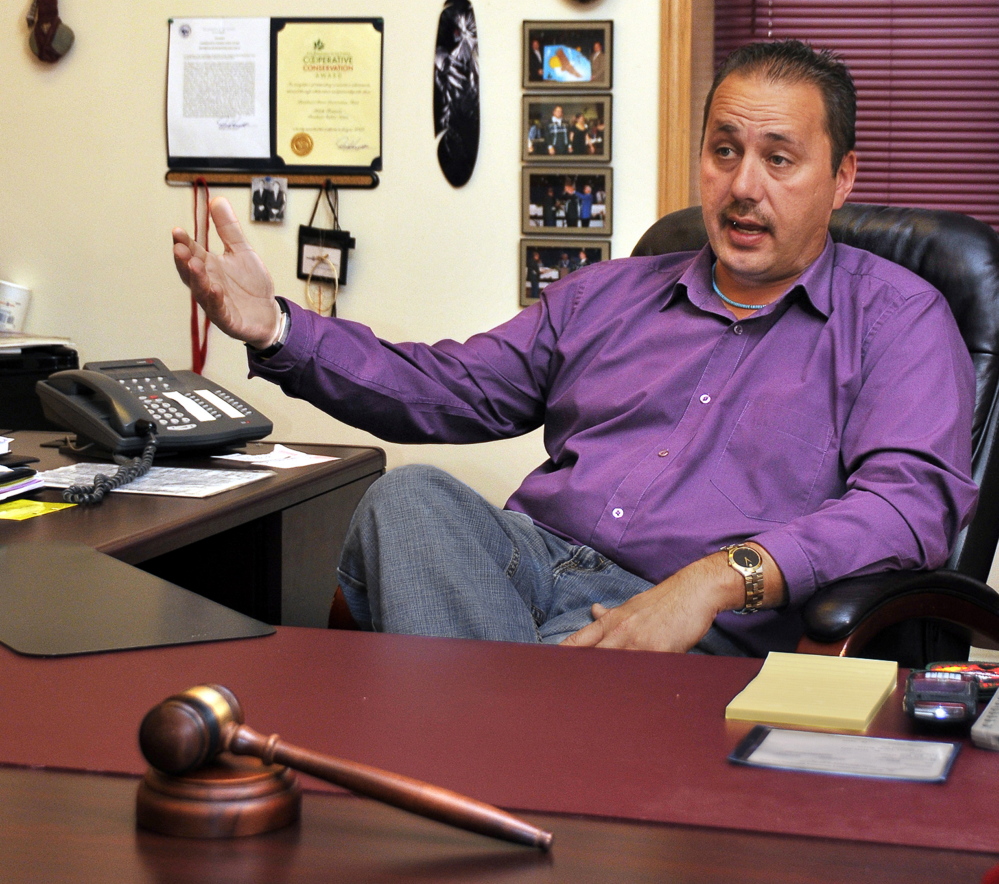Gov. Paul LePage has blasted the U.S. Environmental Protection Agency’s demand that Maine tighten pollution standards to ensure that the state’s Indian tribes can safely eat fish from their waters, calling the ruling an act of retribution and promising to take action to overturn it.
In a fiery Feb. 11 letter to EPA Regional Administrator H. Curtis Spalding, LePage said the ruling that the agency issued to Maine’s Department of Environmental Protection was “outrageous” and “nothing more than retribution against Maine DEP for being willing to take a stand against U.S. EPA” in an ongoing dispute over water quality standards in tribal lands.
Spalding responded Feb. 13, standing by his agency’s actions and expressing “hope we can cooperate in assuring sustenance fishing practices (by the tribes) … will be protected.”
The state DEP will disregard the EPA ruling and continue to issue permits based on existing standards while it seeks “to address the wrongs EPA has caused,” the department said in a statement released last week.
In a related development, the governing councils of the Penobscot Nation and Passamaquoddy Tribe issued resolutions calling on Congress to intervene in the cascading power struggles with the state by convening a congressional inquiry into tribal sovereignty issues.
The latest dispute is over the state’s proposed water quality standards, which are subject to review by the federal agency. On Feb. 2, the EPA informed state authorities that their proposed standards are inadequate to protect sustenance fishermen on the reservations from certain toxins, because such individuals eat much greater volumes of fish than the average Mainer. Sustenance fishermen – those who fish to feed their families – eat many times more fish than the average person; the EPA ruling does not suggest that eating fish from Maine waters is unsafe for most people.
It is also a longstanding front in the decades-long dispute among the state, its four federally recognized Indian tribes and the federal government over tribal rights and powers under the Maine Indian settlement acts, the historic 1980 laws intended to enshrine the negotiated settlement of the Passamaquoddy and Penobscot tribes’ claim to more than half of Maine’s territory. Those two tribes are locked in disputes with the state over saltwater fishing rights, tribal jurisdiction over domestic violence cases by non-Indians on their reservations, and land use regulation on the tribe’s extensive, off-reservation trust lands.
The Penobscot Nation has sued Maine Attorney General Janet Mills in federal court over the state’s assertion that the tribe has no special rights in the main stem of the river that bears its name.
SITUATION ‘BEYOND CONCERNING’
“These issues are plaguing tribal-state relations, and it’s reached a level now that’s beyond concerning,” said Kirk Francis, chief of the Penobscot Nation. “There’s so much we could do in partnership to bring manufacturing back to Maine, to reinvent Maine towns through federal procurement programs that we as tribes can participate in. But we just can’t get by these kind of infantile struggles all the time over who is going to control what.
“These aren’t statutory issues,” said Francis, whose tribe’s Feb. 5 resolution calling for a congressional inquiry was delivered the week before last. “They’re really people issues.”
The EPA’s recent ruling, made in close consultation with the Department of the Interior’s Bureau of Indian Affairs, directs Maine to protect sustenance fishing on Indian lands because it is a “critical element of tribal cultural survival,” which is itself a “clear purpose” of the Maine Indian claims settlement acts. The EPA ordered DEP Commissioner Patricia Aho to come up with stricter new standards within 90 days, or else the agency will impose standards itself under the terms of the federal Clean Water Act.
The ruling was hailed by tribal leaders as an important reassertion of the federal government’s trustee relationship, but has been assailed by the governor, the state Attorney General’s Office, and Matt Manahan, the attorney representing the Lincoln paper mill and 17 other industrial and municipal entities that discharge pollutants into the main stem of the Penobscot River.
“Ultimately this is not about the water quality; this is just a platform to try to undermine the settlement acts,” said Manahan, a partner at Pierce Atwood who has been tangling with the Penobscots for 25 years on behalf of paper companies, dam owners and others. “I don’t think the tribes frankly care if there are job losses to municipalities and industries in Maine, and I don’t think EPA does either.”
ECONOMIC CONSEQUENCES DEBATED
Manahan described potentially dire economic consequences in the Penobscot River valley if more stringent standards are adopted to meet the EPA’s order: municipalities shelling out millions to improve wastewater treatment and having to raise property taxes to pay for it, and industrial users having to scale back production or buy new equipment.
“For companies, this could result in job layoffs or cost increases that might cause them to make decisions to move elsewhere,” he said.
But the EPA says that’s not true, and that municipalities and most industrial dischargers on the river will almost certainly be unaffected by the tighter standards.
“Based on the discharge information we’ve seen for these facilities, the vast majority won’t have to be concerned about most of these standards,” said Ken Moraff, director of ecosystem protection at EPA’s New England office in Boston. “We are not aware of any dischargers that are fundamentally in conflict with the sustenance fishing use.”
Moraff said there may be a few dischargers who might need to take action when their five-year pollution permits are renewed, but that his office “hadn’t seen any information that anybody is going to have a significant problem.”
A FIGHT OVER STATE’S POWERS
LePage, the Attorney General’s Office and Manahan all say the EPA is misinterpreting the settlement acts, pointing to language that gives the state full jurisdiction over environmental regulation – and anything else deemed not to be an “internal tribal matter” – on tribal lands.
LePage’s office did not respond to requests for comment, but the DEP’s release last week accused the EPA of acting improperly by creating a new water standards criterion – sustenance fishing on Indian lands – “without undergoing a public notice or comment process mandated by the (federal) Administrative Procedures Act.” It said the department “is considering all legal and administrative options to address the wrongs which EPA has caused,” and meanwhile “will continue to issue permits based on those (existing) standards, as they are fully protective of water quality.”
DISPUTE PROBABLY HEADED TO COURT
The matter may end up in federal court. LePage, in his letter, said the EPA’s decision “is clearly contrary” to the settlement acts and federal case law, and that the state would “pursue all legal options.” He accused the EPA of dragging its feet in acknowledging Maine’s jurisdiction over tribal areas, only acting when the state sued.
“Let me be very clear,” the governor wrote. “Maine DEP will not be revising its work in an attempt to meet some unknown standard to meet your deadline of 90 days after your agency defied federal law for more than 12 years. … Your demand that we do so … is outrageous.”
Manahan said he hopes the state will appeal in federal court. He accused the EPA and the Bureau of Indian Affairs of working behind the scenes to undermine the state’s jurisdiction. “EPA views its trust responsibility as apparently to say whatever the tribes want, including overturning the settlement acts,” he said.
Chief Francis said his tribe wants a more cooperative relationship with the state, and that its demands regarding the Penobscot River are limited and reasonable.
“We have to coexist in this river; a whole bunch of people want to also be using the river, and we’re not against that, and we’re not against economic development,” he said. “All we’re saying is: Recognize the cultural needs of the tribes in certain sections of the river so we can manage a lifestyle that maintains the cultural traditions of a people.”
Copy the Story LinkSend questions/comments to the editors.




Success. Please wait for the page to reload. If the page does not reload within 5 seconds, please refresh the page.
Enter your email and password to access comments.
Hi, to comment on stories you must . This profile is in addition to your subscription and website login.
Already have a commenting profile? .
Invalid username/password.
Please check your email to confirm and complete your registration.
Only subscribers are eligible to post comments. Please subscribe or login first for digital access. Here’s why.
Use the form below to reset your password. When you've submitted your account email, we will send an email with a reset code.